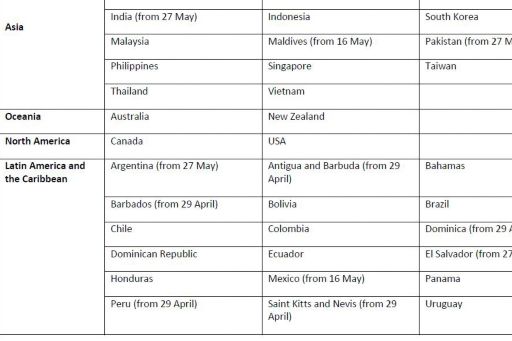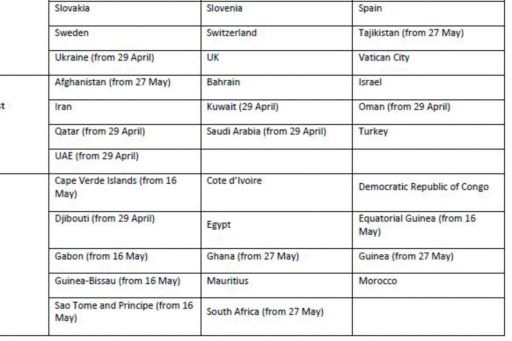Japan – COVID-19: Border Controls and Travel Restrictions Being Extended
Japan–Border Controls and Travel Restrictions Extended
The government of Japan fully lifted the state of emergency that had been in place since April for the last remaining five prefectures (Japan has 47 prefectures): Tokyo, Kanagawa, Chiba, Saitama, and Hokkaido on 25 May. However, sustained border controls and travel restrictions will continue to affect multinational employers and their globally-mobile employees doing business in Japan.

The government of Japan fully lifted the state of emergency that had been in place since April for the last remaining five prefectures (Japan has 47 prefectures): Tokyo, Kanagawa, Chiba, Saitama, and Hokkaido on 25 May.1 (For prior coverage, see GMS Flash Alert 2020-145, 3 April 2020.) It was lifted one week earlier than originally scheduled due to the government having assessed a low rate of infections and death toll. It should be noted that the Japanese-style state of emergency is not a lockdown as seen in other countries. It was based on “self-restraint” – a strategy that largely relies on social pressure brought to bear on individuals and businesses to heed public health advice.
The government however is warning people to still remain cautious so as to prevent a second wave and keep avoiding “Three C’s”: Confined and Crowed places, and Close human contact.2 With that said, Japan will continue to keep the controls on its borders and travel restrictions in place until end June (which can be extended if the government so determines).
WHY THIS MATTERS
The lifting of the state of emergency will bring some much welcome “breathing room” for Japan’s population, as well as those foreign nationals who got stuck in Japan during the coronavirus pandemic.
However, the sustained border controls and travel restrictions will continue to affect multinational employers and their globally-mobile employees doing business in Japan.
Assignments to Japan and hiring new personnel from abroad will be delayed due to ongoing travel restrictions, border controls, and quarantine, as well as the limited access to immigration services due to suspensions of appointments.
Awareness of developments, which are evolving, is vital to help minimise disruptions to operations and to manage associated risks and costs.
Until the government decides it is safe to rescind or more significantly roll-back current restrictions, extensive remote working is a “best practice” for globally-mobile employees, to the extent possible, and is a way for employers to foster the safety of their employees and help ensure business continuity.
Denied Entry (Updated)
Effective from 27 May at 0:00 (JST), foreign nationals who have been physically present within the countries or regions listed in the table below in the 14 days prior to their arrival in Japan are not permitted to land in Japan. Japanese nationals do not fall in the scope of this entry-ban, but they are required, if they return from overseas, to self-quarantine for 14 days upon arrival. Note that the foreign nationals who arrive in Japan on a flight via any of those 111 listed counties below – even for a purpose of refueling or transit – will be denied entering Japan in principle.
Japan has added 11 “new” countries to the “denied-entry” country list on 25 May.3


Measures on Immigration and Travel
- Foreigners with the status of “long-term residents” whose Residence Cards are expiring by the end of July 2020 are automatically granted an extra three months from the actual expiry.4
- Foreign nationals with the following status of residence who have temporarily left Japan with Re-Entry Permission after 26 May 2020 are also subject to the denied entry: “Permanent Resident, “Spouse or Child of Japanese National,” “Spouse or Child of Permanent Resident,” or “Long Term Resident.” The “Special Permanent Resident” status is not in the scope of the entry ban.
- Certificate of Eligibility (CoE) applications already filed for foreign nationals in the above-listed countries continue to be suspended and new applications will not be accepted until further notice.
- Visa applications at the embassies/consulates of Japan in the above-listed countries will not be accepted. Visa applicants in non-listed countries are required to fill in and submit a questionnaire on whether or not they have (or will have) travelled to the countries listed above within the 14 days before arriving in Japan.
- Those foreign nationals who hold valid entry visas for Japan (whether short/long or single/multiple-entry) will not be considered an exception to the refusal of entry.
- The Ministry of Foreign Affairs of Japan has raised its travel alert for Japanese nationals to travel to the above-listed 111 countries to “Level 3 – Avoid All Travel”; this is intended to urge Japanese nationals to avoid all travel to the countries/regions regardless of the purpose. Japanese residents in the countries/regions may be advised to consider or prepare for evacuation. The rest of world is raised to “Level 2 – Avoid Non-essential Travel.”5
Enhanced Quarantine
1. ALL travelers including Japanese nationals entering from the countries NOT listed above must6 :
- complete a questionnaire (health declaration form), undergo temperature scanning, as well as a health check-up by the quarantine officer at the airport.
- self-quarantine for 14 days at an accommodation after their arrival to avoid infections and pay attention to the latest information on the situation in their areas.
2. All entrants (including Japanese nationals, regardless of the purpose of visit) arriving from the countries NOT listed above, even those with no particular symptoms of COVID-19, are subject to7:
- take PCR (Polymerase Chain Reaction) tests in Japan upon arrival at the airport;
- self-quarantine for 14 days from the day of arrival in Japan at the location designated by the quarantine station (e.g., hotel) and refrain from using public transportation.
Also:
- if the PCR result is positive, the individual will be sent to medical institutions or dedicated facilities to receive specialised medical treatment in accordance with the symptoms detected.
- if the PCR result is negative, the individual must self-quarantine for 14 days at the designated hotel where medical staff are located and receive daily health check-ups.
Travellers Check-List
For all travelers, including Japanese nationals, please confirm the below BEFORE your arrival:
- Arranged transportation (excluding public transportation) from the airport to your accommodation. Public transportation includes any means of transportation accessible to the public by paying fares (e.g., domestic flights and ships, local buses including shuttle buses operated by hotel, trains, taxis, etc., this excludes rental cars and privately-owned cars (driven by a family member or a friend)).
- Your schedule in Japan should include the above quarantine measures, and there should be some assurance there will be no foreseeable difficulties during your stay.
- You must secure accommodations (e.g., hotel) in Japan.
- You will bear the cost for your accommodations during the 14-day period.
KPMG NOTE
government.
The immigration authorities currently do not accept the new CoE (Certificate of Eligibility) and visa applications for the 111 listed countries until at least the end of June.
The Immigration Services Agency of Japan also sets the limit on the number of applications per day to help minimise any congestion at the authority which can directly affect applications for the extension of Residence Cards for those foreign nationals remaining in Japan.
The government issued the guideline on 25 May for how to adopt a “new-lifestyle” for the long-term fight against COVID-19. 8 Japan will follow the multi-stage plan to boost social economic recovery; the individual must follow the “roadmap” introduced by the local government. The Tokyo metropolitan area, which has been hit hardest by the coronavirus in Japan, has introduced three phases to gradually restart socio-economic activities. Phase 1 started from 26 May. The local government will conduct a status assessment every two weeks to decide whether the city can enter the next phase of the roadmap.9
FOOTNOTES
1 For additional information, in Japanese, see the website of the prime minister’s office at: https://www.kantei.go.jp/jp/98_abe/actions/202005/25corona.html .
See S. Denyer, “Tokyo Lifts State of Emergency, Braces for ‘New Lifestyle’ with the Virus,” in The Washington Post (online) (May 25, 2020) at: https://www.washingtonpost.com/world/asia_pacific/tokyo-lifts-state-of-emergency-braces-for-new-lifestyle-with-the-virus/2020/05/25/7a0e5836-9b75-11ea-ad79-eef7cd734641_story.html . (Note that this is a 3rd party (non-governmental, non-KPMG) website. Providing this link does not represent an endorsement of this website by KPMG.)
2 See the website of the prime minister’s office at https://www.kantei.go.jp/jp/content/000061868.pdf (PDF 1.21 MB) .
3 See the Ministry of Health, Labour and Welfare (in Japanese) at: https://www.mhlw.go.jp/stf/seisakunitsuite/bunya/0000164708_00001.html#kokumin .
4 See the Immigration Service Agency of Japan (in Japanese): http://www.moj.go.jp/content/001315947.pdf .
5 See the Ministry of Foreign Affairs (in Japanese) at: https://www.anzen.mofa.go.jp/covid19/info0522.html .
6 See the Ministry of Health, Labour and Welfare (in Japanese) at: https://www.mhlw.go.jp/stf/seisakunitsuite/bunya/0000121431_00098.html .
See the Ministry of Foreign Affairs (in Japanese) at: https://www.anzen.mofa.go.jp/info/pcwideareaspecificinfo_2020C052.html .
7 Ibid.
8 See the announcement from 36th Meeting of the Novel Coronavirus Response Headquarters at: https://corona.go.jp/expert-meeting/pdf/sidai_r020525.pdf .
9 Ibid.
VIEW ALL
* Please note the KPMG International member firm in the United States does not provide immigration or labour law services. However, KPMG Law LLP in Canada can assist clients with U.S. immigration matters.
The information contained in this newsletter was submitted by the KPMG International member firm in Japan.
SUBSCRIBE
To subscribe to GMS Flash Alert, fill out the subscription form.
© 2024 KPMG Tax Corporation, a tax corporation incorporated under the Japanese CPTA Law and a member firm of the KPMG network of independent member firms affiliated with KPMG International Cooperative (“KPMG International”), a Swiss entity. All rights reserved.
GMS Flash Alert is a Global Mobility Services publication of the KPMG LLP Washington National Tax practice. The KPMG name and logo are trademarks used under license by the independent member firms of the KPMG global organization. KPMG International Limited is a private English company limited by guarantee and does not provide services to clients. No member firm has any authority to obligate or bind KPMG International or any other member firm vis-à-vis third parties, nor does KPMG International have any such authority to obligate or bind any member firm. The information contained herein is of a general nature and is not intended to address the circumstances of any particular individual or entity. Although we endeavor to provide accurate and timely information, there can be no guarantee that such information is accurate as of the date it is received or that it will continue to be accurate in the future. No one should act on such information without appropriate professional advice after a thorough examination of the particular situation.
